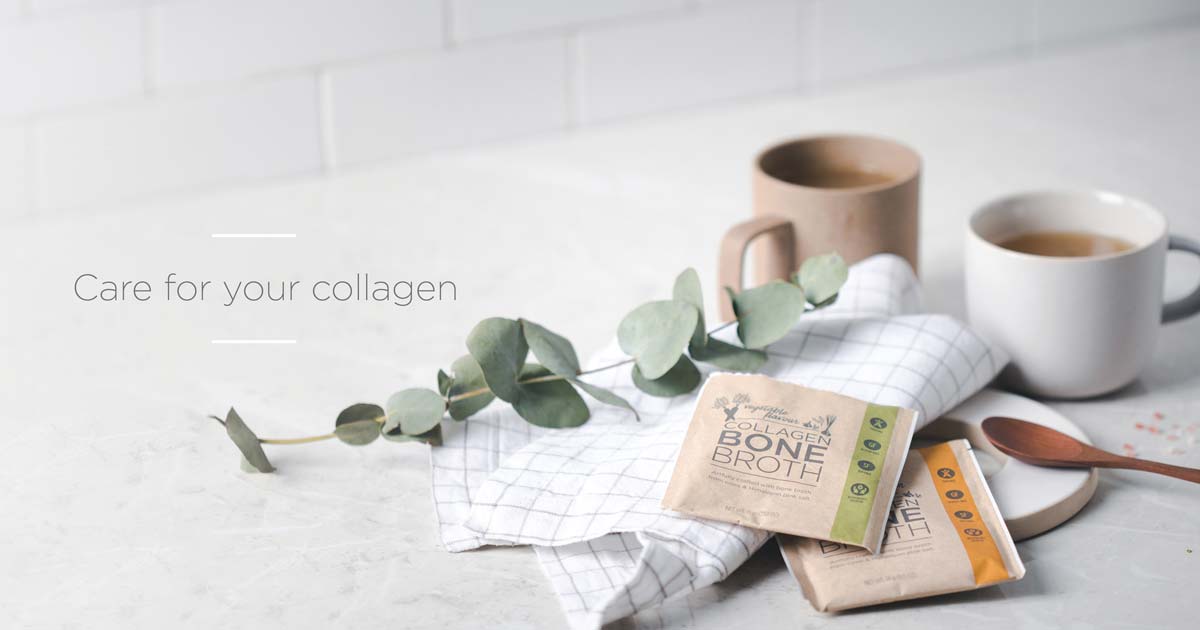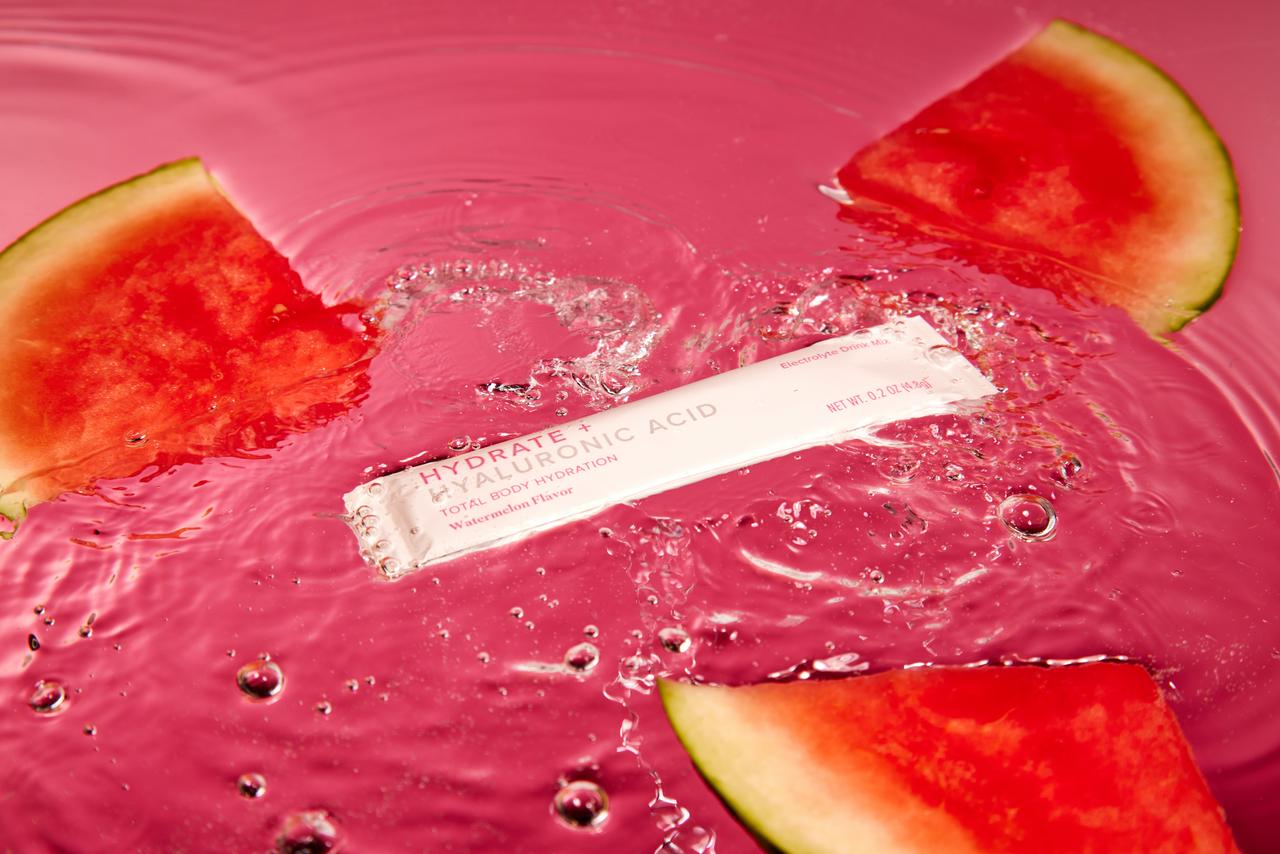Health and beauty trends come in and out of style every year; sometimes, they disappear before we notice. When it comes to collagen, it seems this trend is here to stay. The consumption of collagen in food products, supplements and cosmetic creams doesn’t show any signs of slowing down. Many have dubbed collagen the ‘fountain of youth’ and is seemingly all the rage with health and beauty experts alike. Is collagen craze here to stay? Let’s take a look…
What is Collagen?
Collagen is the powerful protein substance that quite literally holds the body together. It is the connective tissue that provides strength and structure to the body, forming everything from your bones to your skin.
Collagen is naturally produced in your body daily, but over time production can decline and start to slow down as early as 25 years of age, which is way too young to see wrinkles and fine lines. Internally, weaker joints, aches and pains may also occur. Women can experience an increased decline in collagen production following menopause. It doesn’t stop there. Not getting regular collagen in your diet may also lead to reduced collagen production as the body makes collagen from the individual components in the diet.
There are at least 16 types of collagen known, but most of the body is comprised of four main types: type I, II, III and IV. Each type is slightly unique in its function and role in the body, such as:
- Type I – The most predominant collagen in the body as it’s the major structural component in skin, bone, tendons, connective tissues and fibrous cartilage.
- Type II – Mainly found in the elastic cartilage that serves as cushioning for joints.
- Type III – Serves as a supportive structure for organs, arteries and muscles.
- Type IV – Is found in the skin layers and helps with filtration.
What is Collagen’s Role in Health?
Collagen naturally occurs throughout the body but is especially concentrated in the skin, bones and connective tissues. Collagen plays an important role in the body by:
Providing Structure
In the skin, specifically the middle layer of skin called the dermis, collagen creates structure through a fibrous network of cells called fibroblasts. Upon this structure, new cells can grow, helping to replace and restore dead skin cells.
With age, collagen weakens and so does the structural integrity of the skin resulting in wrinkles, fine lines and thinner skin.
In joints, collagen plays an important role in building joint cartilage. With age, the spongy cartilage of the joints can begin to wear away. This can result in weakness, pain, inflammation and immobility.
Providing Protection
Collagen can also act as a protective covering for delicate organs in the body, such as the kidneys (5).
What Damages Collagen?
Age aside, certain things have been shown to accelerate the depletion of collagen levels. Diets rich in sugar and refined carbs, smoking and sun exposure, can weaken collagen and the health of skin and joints (1-3).
What Supports Collagen Production?
To best support the body and production of collagen, it’s important to regularly consume foods and/or supplements rich in the necessary components. Collagen in the body starts as procollagen, which is made by combining the amino acids glycine and proline with vitamin C also being needed in the process (4). Other high-quality sources of protein are needed in the diet as well, to provide the other amino acids needed to make new proteins in the body. By providing the necessary components and amino acids unique to collagen, the body can then make its own.
Another feature to remember about collagen is hydrolysed collagen, also referred to as collagen peptides. This simply means that collagen protein has been broken down into smaller pieces or peptides, and are more readily absorbed in the body.
Does Consuming Collagen Peptides Daily Have Benefit?
Short Answer: Yes! Eating a diet rich in collagen, and especially collagen peptides provide important building blocks that you can’t get otherwise, to help the body make more collagen (6).
On top of the many testimonials you can find on the internet or from talking with friends, researchers have validated the use of high-quality collagen to support:
- Skin Health: Multiple studies have found that consumption of collagen peptides supports skin health, with results showing improved hydration and elasticity of the skin as well as reduced fine lines and wrinkles (6, 7-9).
- Bone Health: Evidence suggests that collagen peptides may help prevent the deterioration of bone density and strength (10, 11).
- Joint Health: A review found that consuming collagen peptides resulted in positive results for improved bone density, joint health, as well as reduced joint pain (10). One study found that athletes felt collagen improved activity-related joint pain (12).
- Increased Muscle Mass: Alongside regular exercise, collagen intake has shown to support an increase in muscle strength and mass (13).
References
- Danby FW. Nutrition and aging skin: sugar and glycation. Clin Dermatol. 2010 Jul-Aug;28(4):409-11. doi: 10.1016/j.clindermatol.2010.03.018.
- Bosch R, Philips N, Suárez-PérezJA, Jarranz A, Devmurari A, Chalensouk-Khaosaat J, González S. Mechanisms of Photoaging and Cutaneous Photocarcinogenesis, and Photoprotective Strategies with Phytochemicals. Antioxidants (Basel). 2015 Jun; 4(2): 248–268. Published online 2015 Mar 26. doi: 10.3390/antiox4020248
- Knuutinen A, Kokkonen N, Risteli J, Vähäkangas K, Kallioinen M, Salo T, Sorsa T, Oikarinen A. Smoking affects collagen synthesis and extracellular matrix turnover in human skin. Br J Dermatol. 2002 Apr;146(4):588-94.
- Harris ED, Rayton JK, Balthrop JE, DiSilvestro RA, Garcia-de-Quevedo M. Copper and the synthesis of elastin and collagen. Ciba Found Symp. 1980;79:163-82.
- Harris ED, Rayton JK, Balthrop JE, DiSilvestro RA, Garcia-de-Quevedo M. Copper and the synthesis of elastin and collagen. Ciba Found Symp. 1980;79:163-82.
- Shigemura Y, Suzuki A, Kurokawa M, Sato Y, Sato K. Changes in composition and content of food-derived peptide in human blood after daily ingestion of collagen hydrolysate for 4 weeks. J Sci Food Agric. 2018 Mar;98(5):1944-1950. doi: 10.1002/jsfa.8677. Epub 2017 Oct 16.
- Borumand M, Sibilla S. Effects of a nutritional supplement containing collagen peptides on skin elasticity, hydration and wrinkles. Journal of Medical Nutrition and Nutraceuticals. (2015) Vol. 4, 47-53. 10.4103/2278-019X.146161
- Proksch E, Segger D, Degwert J, Schunck M, Zague V, Oesser S. Oral supplementation of specific collagen peptides has beneficial effects on human skin physiology: a double-blind, placebo-controlled study. Skin Pharmacol Physiol. 2014;27(1):47-55. doi: 10.1159/000351376. Epub 2013 Aug 14.
- Schunck M, Zague V, Oesser S, Proksch E. Dietary Supplementation with Specific Collagen Peptides Has a Body Mass Index-Dependent Beneficial Effect on Cellulite Morphology. Journal of Medicinal Food Vol. 18, No. 12
- Porfirio E, Fanaro G. Collagen supplementation as a complementary therapy for the prevention and treatment of osteoporosis and osteoarthritis: a systematic review. Revista Brasileira de Geriatria e Gerontologia. (2016) Vol. 19 doi: 10.1590/1809-9823.2016.14145
- Elam ML, Johnson SA, Hooshmand S, Feresin RG, Payton ME, Gu J, Arjmandi BH. A calcium-collagen chelate dietary supplement attenuates bone loss in postmenopausal women with osteopenia: a randomised controlled trial. J Med Food. 2015 Mar;18(3):324-31. doi: 10.1089/jmf.2014.0100. Epub 2014 Oct 14.
- Clark KL, Sebastianelli W, Flechsenhar KR, Aukermann DF, Meza F, Millard RL, Deitch JR, Sherbondy PS, Albert A. 24-Week study on the use of collagen hydrolysate as a dietary supplement in athletes with activity-related joint pain. Curr Med Res Opin. 2008 May;24(5):1485-96. doi: 10.1185/030079908X291967 . Epub 2008 Apr 15.
- Zdzieblik D, Oesser S, Baumstark MW, Gollhofer A, König D. Collagen peptide supplementation in combination with resistance training improves body composition and increases muscle strength in elderly sarcopenic men: a randomised controlled trial. Br J Nutr. 2015 Oct 28; 114(8): 1237–1245. doi: 10.1017/S0007114515002810





